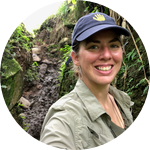About This Project
I am conducting archaeological excavations in Arenal, Costa Rica to understand how prehispanic people here created a resilient lifestyle amidst an ever-changing volcanic landscape since 1450 BC. Volcanic ash has preserved domestic settlements and organic material, allowing a reconstruction of past foodways and environmental management strategies. My hypothesis is that daily life was conducted in a sustainable manner and emphasized maintaining social ties in the area.
Ask the Scientists
Join The DiscussionWhat is the context of this research?
Archaeological analysis of past populations who experienced environmental and cultural disruptions due to natural disasters can better prepare people today to cope with similar threats that occur worldwide. Such events are not unique to the present day. The long-term perspective that can be accessed through archaeology provides a valuable record encompassing thousands of years of how people have prepared for, adjusted, and responded to major environmental events that threatened their way of life. Such events, while devastating, often preserve detailed information about the settings of past societies, subsequently creating a space that can be interpreted by archaeologists today to understand what practices past people used which either helped in survival or lead to their demise.
What is the significance of this project?
Paleoethnobotanical analysis, which is the recovery of plants preserved archaeologically, can reveal information regarding how plants in the past were used as food, medicine, fuel, tools, clothing, construction material, and even art.
Little is known regarding how the ancient inhabitants of Central America lived day to day, achieved resilience to volcanic disasters, and remained connected to their ancestors. Archaeology reveals evidence for practices that helped people achieve long-term sustainability. Did the frequent eruptions of Arenal volcano reinforce traditional knowledge and hazard awareness through generations? This research will reveal ancient household practices, and long-term environmental resilience in Prehispanic Central America.
What are the goals of the project?
The main goal of the project is to conduct excavations and to collect artifacts and preserved botanical remains that reveal the past foodways and resource procurement strategies in ancient Costa Rica. This data will reveal the land management and settlement strategies that allowed Prehispanic peoples to continue living in such a dynamic landscape for thousands of years.
Additionally, a second goal of the project is to determine if the same communities of people occupied this landscape throughout time, persevering through multiple volcanic eruptions. By analyzing multiple time periods in the excavations, we will know if these ancient people survived such environmental catastrophes and what strategies made that possible.
Budget
Flight - This cost will cover the round-trip flight from the US to San Jose, Costa Rica plus the excess luggage required to carry supplies.
Lodging - The cost of room and board of a small house in the Arenal region is about $250/month and the project will last three months. This lodging space will also serve as a field laboratory to process and analyze artifacts and samples.
Field Supplies - A series of materials and supplies (Shovels, trowels, tarp, nails, string, rope, wheelbarrow, machetes, gloves, screen, buckets, and measuring tape) will assist with accurate sample collection, flotation, storage, and analysis of artifacts.
 Project Timeline
Project Timeline
Active excavations along Lake Arenal will occur in May and June. Excavations will uncover multiple Prehispanic households in a village preserved by the Arenal Volcano. Work in July will focus on processing soil samples using a flotation machine in order to recover preserved botanical remains that float when submerged in water.
Project analysis and interpretation of results will be reported via an open-access source within a year since excavations.
May 30, 2020
Travel to the Arenal region, Costa Rica
Jul 31, 2020
Excavate ancient household structure and collect paleoethnobotanical data.
Dec 31, 2020
Generate an open-access report of findings.
Meet the Team
Venicia Slotten
I am a PhD candidate at the University of California, Berkeley in the department of Anthropology. I focus on archaeology in Latin America and specialize in the recovery and identification of ancient plant remains.
My research focuses on the study of household contexts because this space depicts the everyday lives of people in the past, not just what their political leadership or ceremonial practices were like. I believe that analysis of domestic spaces will create a more accurate depiction of people's lives in the past.
I also believe that it is important to look at past peoples strategies of environmental management in order to better inform our actions today. That is why I am interested in pursuing archaeological excavations in the Arenal region of Costa Rica, since ancient populations lived in this ever-changing landscape for thousands of years while maintaining their cultural values.
I approach these research interests through the study of preserved plant remains because plants are linked to so many different aspects of life. Plants comprise the majority of the food we consume and wood is used as the main source of fuel to cook food. Plants have such a diverse range of applications in our lives, from the medicine used to heal our illnesses to the wooden beams that support our homes and structures. I feel that understanding how people used plants in the past is so fascinating because it can reveal so much information!
Project Backers
- 0Backers
- 0%Funded
- $0Total Donations
- $0Average Donation
